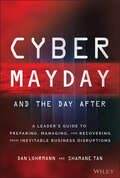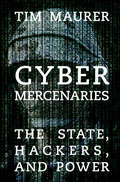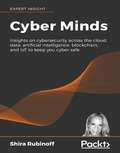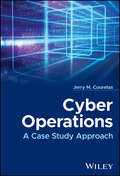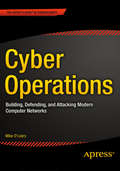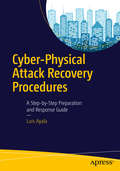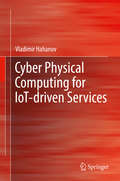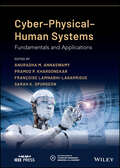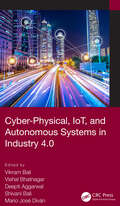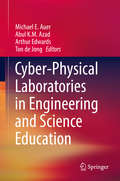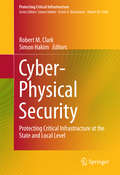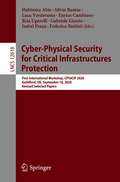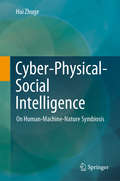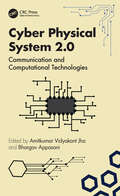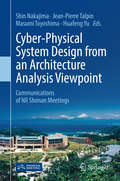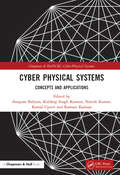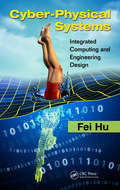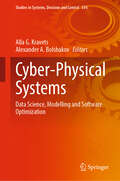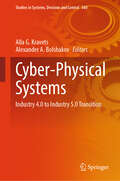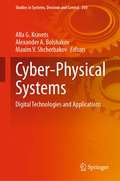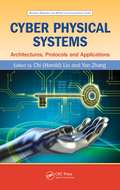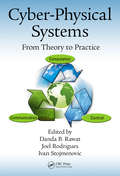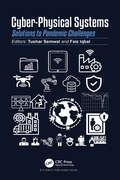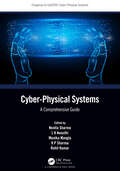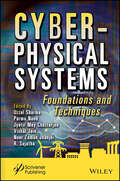- Table View
- List View
Cyber Mayday and the Day After: A Leader's Guide to Preparing, Managing, and Recovering from Inevitable Business Disruptions
by Daniel Lohrmann Shamane TanSuccessfully lead your company through the worst crises with this first-hand look at emergency leadership Cyber security failures made for splashy headlines in recent years, giving us some of the most spectacular stories of the year. From the Solar Winds hack to the Colonial Pipeline ransomware event, these incidents highlighted the centrality of competent crisis leadership. Cyber Mayday and the Day After offers readers a roadmap to leading organizations through dramatic emergencies by mining the wisdom of C-level executives from around the globe. It’s loaded with interviews with managers and leaders who've been through the crucible and survived to tell the tale. From former FBI agents to Chief Information Security Officers, these leaders led their companies and agencies through the worst of times and share their hands-on wisdom. In this book, you’ll find out: What leaders wish they'd known before an emergency and how they've created a crisis game plan for future situations How executive-level media responses can maintain – or shatter – consumer and public trust in your firm How to use communication, coordination, teamwork, and partnerships with vendors and law enforcement to implement your crisis response Cyber Mayday and the Day After is a must-read experience that offers managers, executives, and other current or aspiring leaders a first-hand look at how to lead others through rapidly evolving crises.
Cyber Mercenaries: The State, Hackers, and Power
by Tim MaurerCyber Mercenaries explores the secretive relationships between states and hackers. As cyberspace has emerged as the new frontier for geopolitics, states have become entrepreneurial in their sponsorship, deployment, and exploitation of hackers as proxies to project power. Such modern-day mercenaries and privateers can impose significant harm undermining global security, stability, and human rights. These state-hacker relationships therefore raise important questions about the control, authority, and use of offensive cyber capabilities. While different countries pursue different models for their proxy relationships, they face the common challenge of balancing the benefits of these relationships with their costs and the potential risks of escalation. This book examines case studies in the United States, Iran, Syria, Russia, and China for the purpose of establishing a framework to better understand and manage the impact and risks of cyber proxies on global politics.
Cyber Minds: Insights on cybersecurity across the cloud, data, artificial intelligence, blockchain, and IoT to keep you cyber safe
by Shira RubinoffCyber Minds brings together an unrivalled panel of international experts who offer their insights into current cybersecurity issues in the military, business, and government. Key Features Explore the latest developments in cybersecurity Hear expert insight from the industry's top practitioners Dive deep into cyber threats in business, government, and military Book Description Shira Rubinoff's Cyber Minds brings together the top authorities in cybersecurity to discuss the emergent threats that face industries, societies, militaries, and governments today. With new technology threats, rising international tensions, and state-sponsored cyber attacks, cybersecurity is more important than ever. Cyber Minds serves as a strategic briefing on cybersecurity and data safety, collecting expert insights from sector security leaders, including: General Gregory Touhill, former Federal Chief Information Security Officer of the United States Kevin L. Jackson, CEO and Founder, GovCloud Mark Lynd, Digital Business Leader, NETSYNC Joseph Steinberg, Internet Security advisor and thought leader Jim Reavis, Co-Founder and CEO, Cloud Security Alliance Dr. Tom Kellerman, Chief Cybersecurity Officer for Carbon Black Inc and Vice Chair of Strategic Cyber Ventures Board Mary Ann Davidson, Chief Security Officer, Oracle Dr. Sally Eaves, Emergent Technology CTO, Global Strategy Advisor – Blockchain AI FinTech, Social Impact award winner, keynote speaker and author Dr. Guenther Dobrauz, Partner with PwC in Zurich and Leader of PwC Legal Switzerland Barmak Meftah, President, AT&T Cybersecurity Cleve Adams, CEO, Site 1001 (AI and big data based smart building company) Ann Johnson, Corporate Vice President – Cybersecurity Solutions Group, Microsoft Barbara Humpton, CEO, Siemens USA Businesses and states depend on effective cybersecurity. This book will help you to arm and inform yourself on what you need to know to keep your business – or your country – safe. What you will learn The threats and opportunities presented by AI How to mitigate social engineering and other human threats Developing cybersecurity strategies for the cloud Major data breaches, their causes, consequences, and key takeaways Blockchain applications for cybersecurity Implications of IoT and how to secure IoT services The role of security in cyberterrorism and state-sponsored cyber attacks Who this book is for This book is essential reading for business leaders, the C-Suite, board members, IT decision makers within an organization, and anyone with a responsibility for cybersecurity.
Cyber Operations: A Case Study Approach
by Jerry M. CouretasCyber Operations A rigorous new framework for understanding the world of the future Information technology is evolving at a truly revolutionary pace, creating with every passing year a more connected world with an ever-expanding digital footprint. Cyber technologies like voice-activated search, automated transport, and the Internet of Things are only broadening the interface between the personal and the online, which creates new challenges and new opportunities. Improving both user security and quality of life demands a rigorous, farsighted approach to cyber operations. Cyber Operations offers a groundbreaking contribution to this effort, departing from earlier works to offer a comprehensive, structured framework for analyzing cyber systems and their interactions. Drawing on operational examples and real-world case studies, it promises to provide both cyber security professionals and cyber technologies designers with the conceptual models and practical methodologies they need to succeed. Cyber Operations readers will also find: Detailed discussions of case studies including the 2016 United States Presidential Election, the Dragonfly Campaign, and more Coverage of cyber attack impacts ranging from the psychological to attacks on physical infrastructure Insight from an author with top-level experience in cyber security Cyber Operations is ideal for all technological professionals or policymakers looking to develop their understanding of cyber issues.
Cyber Operations
by Mike O'LearyCyber Operations walks you through all the processes to set up, defend, and attack computer networks. This book focuses on networks and real attacks, offers extensive coverage of offensive and defensive techniques, and is supported by a rich collection of exercises and resources.You'll learn how to configure your network from the ground up, starting by setting up your virtual test environment with basics like DNS and active directory, through common network services, and ending with complex web applications involving web servers and backend databases.Key defensive techniques are integrated throughout the exposition. You will develop situational awareness of your network and will build a complete defensive infrastructure—including log servers, network firewalls, web application firewalls, and intrusion detection systems.Of course, you cannot truly understand how to defend a network if you do not know how to attack it, so you will attack your test systems in a variety of ways beginning with elementary attacks against browsers and culminating with a case study of the compromise of a defended e-commerce site.The author, who has coached his university’s cyber defense team three times to the finals of the National Collegiate Cyber Defense Competition, provides a practical, hands-on approach to cyber security.
Cyber-Physical Attack Recovery Procedures: A Step-by-Step Preparation and Response Guide
by Luis AyalaThis book provides a template with step-by-step instructions on how to respond and recover when hackers get into your SCADA system and cause building equipment to act erratically or fail completely. When hackers shut off the water, turn off the building power, disable the sewage effluent pumps and activate the fire alarm, you have to do something quick. It is even more alarming that hackers can do all those things at the same time even from the other side of the planet. Not every equipment failure or power outage is a cyber-physical attack. When your building is attacked, you probably won t suspect it was a hacker until you see a pattern. The building control system (BCS) will act "squirrelly" and you will know it really is a cyber-physical attack. Once a cyber-physical attack occurs, it can mean years of court cases, job losses, higher insurance rates, and maybe even criminal litigation. It also takes years to overcome the loss of safety credibility to your employees and the local community. Cyber-Physical Attack Recovery Procedures provides a detailed guide to taking the right steps ahead of time, and equipping your facility and employees with the training, knowledge, and tools they need and may save lives. The book contains: A one-of-a-kind action plan describing how hackers attack building equipment, the extent of damage possible, and how to respond when a cyber-physical attack occurs. Detailed descriptions of cyber-physical attacks directed against SCADA systems or building controls, as well as cyber booby traps Invaluable appendices, including: Emergency Procedures, Team Staffing and Tasking, Alternate Site Procedures, a Documentation List, Software and Hardware Inventories, Vendor Contact Lists, External Support Agreements, and much more. What you ll learn Possible ways hackers can cause building equipment to fail. How to quickly assess the threat to his facilities in real time, how to stop a cyber-physical attack. How to restore equipment operation without doing any more damage. Who This Book Is For Architects, Engineers, Building Managers, Students, Researchers and Consultants interested in cybersecurity-attacks against facilities in the real world. Also for IT professionals getting involved in cybersecurity responsibilities. "
Cyber Physical Computing for IoT-driven Services
by Vladimir HahanovThis book presents the cyber culture of micro, macro, cosmological, and virtual computing. The book shows how these work to formulate, explain, and predict the current processes and phenomena monitoring and controlling technology in the physical and virtual space. The authors posit a basic proposal to transform description of the function truth table and structure adjacency matrix to a qubit vector that focuses on memory-driven computing based on logic parallel operations performance. The authors offer a metric for the measurement of processes and phenomena in a cyberspace, and also the architecture of logic associative computing for decision-making and big data analysis. The book outlines an innovative theory and practice of design, test, simulation, and diagnosis of digital systems based on the use of a qubit coverage-vector to describe the functional components and structures. Authors provide a description of the technology for SoC HDL-model diagnosis, based on Test Assertion Blocks Activated Graph. Examples of cyber-physical systems for digital monitoring and cloud management of social objects and transport are proposed. A presented automaton model of cosmological computing explains the cyclical and harmonious evolution of matter-energy essence, and also a space-time form of the Universe.
Cyber-Physical-Human Systems: Fundamentals and Applications (IEEE Press Series on Technology Management, Innovation, and Leadership)
by Anuradha M. Annaswamy Pramod P. Khargonekar Françoise Lamnabhi‐Lagarrigue Sarah K. SpurgeonCyber–Physical–Human Systems A comprehensive edited volume exploring the latest in the interactions between cyber–physical systems and humans In Cyber–Physical–Human Systems: Fundamentals and Applications, a team of distinguished researchers delivers a robust and up-to-date volume of contributions from leading researchers on Cyber–Physical–Human Systems, an emerging class of systems with increased interactions between cyber–physical, and human systems communicating with each other at various levels across space and time, so as to achieve desired performance related to human welfare, efficiency, and sustainability. The editors have focused on papers that address the power of emerging CPHS disciplines, all of which feature humans as an active component during cyber and physical interactions. Articles that span fundamental concepts and methods to various applications in engineering sectors of transportation, robotics, and healthcare and general socio-technical systems such as smart cities are featured. Together, these articles address challenges and opportunities that arise due to the emerging interactions between cyber–physical systems and humans, allowing readers to appreciate the intersection of cyber–physical system research and human behavior in large-scale systems. In the book, readers will also find: A thorough introduction to the fundamentals of cyber–physical–human systems In-depth discussions of cyber–physical–human systems with applications in transportation, robotics, and healthcare A comprehensive treatment of socio-technical systems, including social networks and smart cities Perfect for cyber–physical systems researchers, academics, and graduate students, Cyber–Physical–Human Systems: Fundamentals and Applications will also earn a place in the libraries of research and development professionals working in industry and government agencies.
Cyber-Physical, IoT, and Autonomous Systems in Industry 4.0
by Vikram Bali Vishal Bhatnagar Deepti Aggarwal Shivani Bali Mario José DivánThis book addresses topics related to the Internet of Things (IoT), machine learning, cyber-physical systems, cloud computing, and autonomous vehicles in Industry 4.0. It investigates challenges across multiple sectors and industries and considers Industry 4.0 for operations research and supply chain management.Cyber-Physical, IoT, and Autonomous Systems in Industry 4.0 encourages readers to develop novel theories and enrich their knowledge to foster sustainability. It examines the recent research trends and the future of cyber-physical systems, IoT, and autonomous systems as they relate to Industry 4.0. This book is intended for undergraduates, postgraduates, academics, researchers, and industry individuals to explore new ideas, techniques, and tools related to Industry 4.0.
Cyber-Physical Laboratories in Engineering and Science Education
by Michael E. Auer Arthur Edwards Ton De Jong Abul K.M. AzadThis volume investigates a number of issues needed to develop a modular, effective, versatile, cost effective, pedagogically-embedded, user-friendly, and sustainable online laboratory system that can deliver its true potential in the national and global arenas. This allows individual researchers to develop their own modular systems with a level of creativity and innovation while at the same time ensuring continuing growth by separating the responsibility for creating online laboratories from the responsibility for overseeing the students who use them. The volume first introduces the reader to several system architectures that have proven successful in many online laboratory settings. The following chapters then describe real-life experiences in the area of online laboratories from both technological and educational points of view. The volume further collects experiences and evidence on the effective use of online labs in the context of a diversity of pedagogical issues. It also illustrates successful online laboratories to highlight best practices as case studies and describes the technological design strategies, implementation details, and classroom activities as well as learning from these developments. Finally the volume describes the creation and deployment of commercial products, tools and services for online laboratory development. It also provides an idea about the developments that are on the horizon to support this area.
Cyber-Physical Security: Protecting Critical Infrastructure at the State and Local Level (Protecting Critical Infrastructure #3)
by Simon Hakim Robert M. ClarkThis book focuses on the vulnerabilities of state and local services to cyber-threats and suggests possible protective action that might be taken against such threats. Cyber-threats to U. S. critical infrastructure are of growing concern to policymakers, managers and consumers. Information and communications technology (ICT) is ubiquitous and many ICT devices and other components are interdependent; therefore, disruption of one component may have a negative, cascading effect on others. Cyber-attacks might include denial of service, theft or manipulation of data. Damage to critical infrastructure through a cyber-based attack could have a significant impact on the national security, the economy, and the livelihood and safety of many individual citizens. Traditionally cyber security has generally been viewed as being focused on higher level threats such as those against the internet or the Federal government. Little attention has been paid to cyber-security at the state and local level. However, these governmental units play a critical role in providing services to local residents and consequently are highly vulnerable to cyber-threats. The failure of these services, such as waste water collection and water supply, transportation, public safety, utility services, and communication services, would pose a great threat to the public. Featuring contributions from leading experts in the field, this volume is intended for state and local government officials and managers, state and Federal officials, academics, and public policy specialists.
Cyber-Physical Security for Critical Infrastructures Protection: First International Workshop, CPS4CIP 2020, Guildford, UK, September 18, 2020, Revised Selected Papers (Lecture Notes in Computer Science #12618)
by Habtamu Abie Silvio Ranise Luca Verderame Enrico Cambiaso Rita Ugarelli Gabriele Giunta Isabel Praça Federica BattistiThis book constitutes the refereed proceedings of the First International Workshop on Cyber-Physical Security for Critical Infrastructures Protection, CPS4CIP 2020, which was organized in conjunction with the European Symposium on Research in Computer Security, ESORICS 2020, and held online on September 2020.The 14 full papers presented in this volume were carefully reviewed and selected from 24 submissions. They were organized in topical sections named: security threat intelligence; data anomaly detection: predict and prevent; computer vision and dataset for security; security management and governance; and impact propagation and power traffic analysis.The book contains 6 chapters which are available open access under a CC-BY license.
Cyber-Physical-Social Intelligence: On Human-Machine-Nature Symbiosis (Springerbriefs In Computer Science Ser.)
by Hai ZhugeThis book explores next-generation artificial intelligence based on the symbiosis between humans, machines and nature, including the rules and emerging patterns of recognition, and the integration and optimization of various flows through cyberspace, physical space and social space. It unveils a reciprocal human-machine-nature symbiotic mechanism together with relevant rules on structuring and evolving reality, and also proposes a multi-dimensional space for modelling reality and managing the methodologies for exploring reality. As such it lays the foundation for the emerging research area cyber-physical-social intelligence. Inspiring researchers and university students to explore the development of intelligence and scientific methodology, it is intended for researchers and broad readers with a basic understanding of computer science and the natural sciences. Next-generation artificial intelligence will extend machine intelligence and human intelligence to cyber-physical-social intelligence rendered by various interactions in cyberspace, physical space and social space. With the transformational development of science and society, a multi-dimensional reality is emerging and evolving, leading to the generation and development of various spaces obeying different principles. A fundamental scientific challenge is uncovering the essential mechanisms and principles that structure and evolve the reality emerging and evolving along various dimensions. Meeting this challenge requires identifying the basic relations between humans, machines and nature in order to reveal the cyber-physical-social principles.
Cyber Physical System 2.0: Communication and Computational Technologies
by Amitkumar Vidyakant Jha Bhargav AppasaniThe book covers the emerging communication and computational technologies for future cyber-physical systems and discusses the security of in-vehicle communication protocols using automotive embedded systems, presenting an in-depth analysis across various domains, such as manufacturing, transportation, health-care, and smart cities.This book: Discusses how communication and computing co-design provides dynamic adaptability and centralized control. Presents the convergence of physical and digital realities within the metaverse and multiverse, setting the stage for the future of cyber-physical-social systems (CPSS). Presents emerging communication and computational technologies, such as 6G, software-defined networking, cloud computing, blockchain, artificial intelligence, machine learning, virtual reality, and blockchain, for the design and implementation of cyber-physical systems. Explores advanced topics such as security and privacy in industrial CPS, strategies for protecting serial industrial networks, and enhancing firmware update security in automotive systems. It is primarily written for senior undergraduates, graduate students, and academic researchers in the fields of electrical engineering, electronics and communication engineering, computer science and engineering, and information technology.
Cyber-Physical System Design from an Architecture Analysis Viewpoint: Communications of NII Shonan Meetings
by Jean-Pierre Talpin Shin Nakajima Masumi Toyoshima Huafeng YuProviding a wide variety of technologies for ensuring the safety and dependability of cyber-physical systems (CPS), this book offers a comprehensive introduction to the architecture-centric modeling, analysis, and verification of CPS. In particular, it focuses on model driven engineering methods including architecture description languages, virtual prototyping, and formal analysis methods. CPS are based on a new design paradigm intended to enable emerging software-intensive systems. Embedded computers and networks monitor and control the physical processes, usually with the help of feedback loops where physical processes affect computations and vice versa. The principal challenges in system design lie in this constant interaction of software, hardware and physics. Developing reliable CPS has become a critical issue for the industry and society, because many applications such as transportation, power distribution, medical equipment and tele-medicine are dependent on CPS. Safety and security requirements must be ensured by means of powerful validation tools. Satisfying such requirements, including quality of service, implies having formally proven the required properties of the system before it is deployed. The book is concerned with internationally standardized modeling languages such as AADL, SysML, and MARTE. As the effectiveness of the technologies is demonstrated with industrial sample cases from the automotive and aerospace sectors, links between the methods presented and industrial problems are clearly understandable. Each chapter is self-contained, addressing specific scientific or engineering problems, and identifying further issues. In closing, it includes perspectives on future directions in CPS design from an architecture analysis viewpoint.
Cyber Physical Systems: Concepts and Applications (Chapman & Hall/CRC Cyber-Physical Systems)
by Anupam Baliyan, Kuldeep Singh Kaswan, Naresh Kumar, Kamal Upreti, and Ramani KannanCyber Physical System (CPS) is an integration of computation, networking, and physical processes: the combination of several systems ofdifferent nature whose main purpose is tocontrol a physical process and, through feedback, adapt itself to new conditions, in real time.Cyber Physical System: Concepts and Applications includes an in-depth coverage of the latestmodels and theories that unify perspectives. It expresses the interacting dynamics of the computational and physical components of asystem in a dynamic environment. Covers automatic application of software countermeasures against physical attacks and impact of cyber physical system on industry 4.0 Explains how formal models provide mathematical abstractions to manage the complexity of a system design Offers a rigorous and comprehensive introduction to the principles of design,specification, modelling, and analysis of cyber physicalsystems Discusses the multiple domains where Cyber Physical system has a vital impact and provides knowledge about different models thatprovide mathematical abstractions tomanage the complexity of a system design Provides the rapidly expanding field of cyber-physical systems with a Long-needed foundational text by an established authority This book is primarily aimed at advanced undergraduates, graduates of computer science. Engineers will also find this book useful.
Cyber-Physical Systems: Integrated Computing and Engineering Design
by Fei HuThis book supplies comprehensive coverage of the principles and design of CPSs. It addresses the many challenges that must be overcome and outlines a roadmap of how to get there. Covering the most important design theories and modeling methods for a practical CPS, text presents concrete CPS designs for popular civilian applications, including building and energy management.Reflecting the importance of human health care in society, it includes CPS examples of rehabilitation applications such as virtual reality-based disability recovery platforms.
Cyber-Physical Systems: Data Science, Modelling and Software Optimization (Studies in Systems, Decision and Control #554)
by Alla G. KravetsThis book is devoted to new approaches to modeling and design of cyber-physical systems. Nowadays, cyber-physical systems become widely used in different domains. Scientific society suggests new approaches to engineering and optimization of cyber-physical systems, however, there are still open questions that need to be covered by research and development. It presents results and findings in the field of Data Science and digital twin engineering for cyber-physical systems. This book provides scientific, practical, and methodological approaches to modeling of complex processes for cyber-physical systems. The authors highlight essential results on software optimization in cyber-physical systems. The target audience of the book are practitioners, enterprise representatives, scientists, Ph.D., and master’s students who perform scientific research or applications of cyber-physical systems for various domains.
Cyber-Physical Systems: Industry 4.0 to Industry 5.0 Transition (Studies in Systems, Decision and Control #560)
by Alla G. Kravets Alexander A. BolshakovThis book presents a comprehensive overview of the latest advancements in the field of cyber-physical systems, focusing on the transition from Industry 4.0 to Industry 5.0. This transition emphasizes the increased role of humans in the manufacturing process, the introduction of new technologies, and improvements in management and security. The book covers various topics, including neural network and synergetic approaches to solving problems, decentralized identifiers methods classification, identification of technological opportunities for enterprises, and cybernetic technologies to counter passive and active cyberattacks. This book is an essential resource for researchers, engineers, and students interested in the field of cyber-physical systems, as well as for professionals working in industries that are undergoing the transition from Industry 4.0 to Industry 5.0.
Cyber-Physical Systems: Digital Technologies and Applications (Studies in Systems, Decision and Control #350)
by Alla G. Kravets Alexander A. Bolshakov Maxim V. ShcherbakovThis book offers ideas to help improve digital technologies and increase their efficiency during implementation and application for researchers and practitioners. The outstanding position of the book among others is that it dwells with cyber-physical systems’ progress and proposes ideas and finding around digital tools and technologies and their application. A distinguished contribution is in presenting results on Digital Twins development and application, enhancing approaches of communication and information transferring between cyber-physical systems connected within the Internet of things platforms, computer linguistic as a part of cyber-physical systems, intelligent cybersecurity and computer vision systems. The target audience of this book also includes practitioners and experts, as well as state authorities and representatives of manufacturing and industry who are interested in creating and implementing of cyber-physical systems in framework of digitalization projects.
Cyber Physical Systems: Architectures, Protocols and Applications
by Chi Harold Liu Yan ZhangCyber Physical Systems: Architectures, Protocols and Applications helps you understand the basic principles and key supporting standards of CPS. It analyzes different CPS applications from the bottom up, extracting the common characters that form a vertical structure. It presents mobile sensing platforms and their applications toward interrelated p
Cyber-Physical Systems: From Theory to Practice
by Danda B. Rawat Joel J.P.C. Rodrigues Ivan StojmenovicAlthough comprehensive knowledge of cyber-physical systems (CPS) is becoming a must for researchers, practitioners, system designers, policy makers, system managers, and administrators, there has been a need for a comprehensive and up-to-date source of research and information on cyber-physical systems. This book fills that need.Cyber-Physical Syst
Cyber-Physical Systems: Solutions to Pandemic Challenges
by Tushar SemwalA Cyber-Physical System (CPS) is an integration of cyber components with their physical counterparts. A cyber unit could be either a software or hardware. Physical components are those objects, which are governed by the law of physics. CPS have transformed how we interact with the physical world, ranging from sensing the environmental parameters to controlling a complex manufacturing industry. The current pandemic has had catastrophic implications people all across the world in terms of health and economy. This book presents the significance and practicality of CPS in a pandemic situation. It provides a strong foundation to the CPS while also incorporating the latest theoretical advances and practical applications to alleviate the state of a pandemic. The book covers… Theoretical background and application-oriented overview of the different CPS models Impact of COVID-19 and similar pandemics on the engineering aspects of various industries and organisations Exciting and impactful CPS based solutions to the different pandemic situations Security and privacy in CPS when applied to critical and sensitive pandemic affected environment Describes the government-funded projects and work using CPS in real-world scenarios The book provides a unique and fresh exposure to CPS employed in a pandemic situation. It brings together researchers, practitioners, academics, experts, and industry professionals from around the world to share their knowledge and experience.
Cyber-Physical Systems: A Comprehensive Guide (Chapman & Hall/CRC Cyber-Physical Systems)
by Nonita SharmaCyber-Physical Systems: A Comprehensive Guide explores the complete sys-tem perspective, underlying theories, modelling, and the applications of Cyber Physical Systems (CPS). It aims to cover all topics ranging from discussion of ru-diments of the system, efficient management, to recent research challenges and issues. Editors aim to present the book in a self-sufficient manner and to achieve this, the book has been edited to include all the aspects of CPS. The book fo-cuses on the concept map of CPS including latest technological interventions; issues, challenges, and the integration of CPS with IoT & Big Data Analytics. This aims to bring together unique contributions on cyber-physical systems research and education with applications in industrial, agriculture, and medical domains. The main aim of the book is to provide a roadmap to the latest advancements to provide optimal solutions in the field of CPS. Features • Coverage of rudiments of the subject• Discussion of recent advancements in the associated field• Considers an audience of diverse domains• Suitable for students (both UG and PG level) and researchers in the field of CPS This book aims to present the emergence of Cyber Physical Systems in response to revolutionary advancements in IoT. While discussing the associated challenges, it also endeavors to devise efficient models which are competent to address these challenges. This book aims to cater to researchers and academicians working in the related field of CPS.
Cyber-Physical Systems: Foundations and Techniques (Advances In Computer And Electrical Engineering Ser.)
by Uzzal Sharma Parma Nand Jyotir Moy Chatterjee Vishal Jain Noor Zaman Jhanjhi R. SujathaCYBER-PHYSICAL SYSTEMS The 13 chapters in this book cover the various aspects associated with Cyber-Physical Systems (CPS) such as algorithms, application areas, and the improvement of existing technology such as machine learning, big data and robotics. Cyber-Physical Systems (CPS) is the interconnection of the virtual or cyber and the physical system. It is realized by combining three well-known technologies, namely “Embedded Systems,” “Sensors and Actuators,” and “Network and Communication Systems.” These technologies combine to form a system known as CPS. In CPS, the physical process and information processing are so tightly connected that it is hard to distinguish the individual contribution of each process from the output. Some exciting innovations such as autonomous cars, quadcopter, spaceships, sophisticated medical devices fall under CPS. The scope of CPS is tremendous. In CPS, one sees the applications of various emerging technologies such as artificial intelligence (AI), Internet of Things (IoT), machine learning (ML), deep learning (DL), big data (BD), robotics, quantum technology, etc. In almost all sectors, whether it is education, health, human resource development, skill improvement, startup strategy, etc., one sees an enhancement in the quality of output because of the emergence of CPS into the field. Audience Researchers in Information technology, artificial intelligence, robotics, electronics and electrical engineering.
